No edit summary |
(Adding categories) |
||
| Line 36: | Line 36: | ||
[[Category:I]] |
[[Category:I]] |
||
[[Category:Imperium]] |
[[Category:Imperium]] |
||
| + | [[Category:Inquisitors]] |
||
| + | [[Category:Imperial Ordo]] |
||
Revision as of 21:00, 4 December 2011
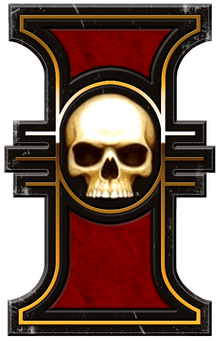
The Rosette of the Imperial Inquisition
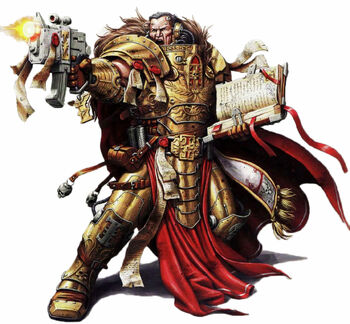
An Inquisitor of the Ordo Malleus in Power Armour
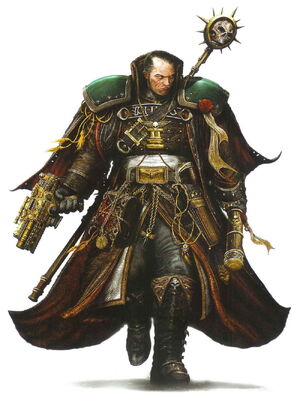
Inquisitor Gregor Eisenhorn of the Ordo Xenos
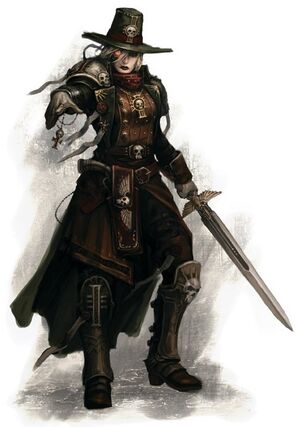
An Ordo Hereticus Inquisitor, armed with Power Sword and Inferno Pistol
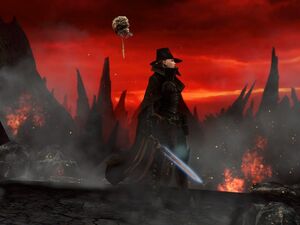
Inquisitor Adrastia of the Ordo Hereticus and her Servo-skull Familiar
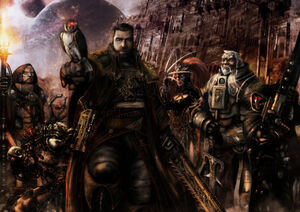
An Inquisitor with his retinue of Acolytes and Throne Agents
An Inquisitor is a clandestine agent and highest-ranking member of the Imperial Inquisition. They are the secret policemen and intelligence agency of the Imperium, driven by ancient order of the Emperor of Mankind to ensure the security of the Imperium of Man from the taints of Chaos, the daemonic threats of the Warp and the dangers presented to Mankind by intelligent alien species like the Orks, the Tyranids, the Eldar, the Necrons and the Tau. Split into three main Orders, the Ordo Xenos (Alien Hunters), the Ordo Malleus (Daemon Hunters) and the Ordo Hereticus (Witch Hunters), the Inquisition is ruthless in uncovering and snuffing out Chaotic corruption, heresy, and mutation wherever they may be found among the million worlds of Mankind. The relentless and deadly agents of the Inquisition have infiltrated every facet of human society to insure that Chaos can never again take root in the Imperium and that no alien race will replace humanity as the dominant intelligent species of the Milky Way Galaxy.
Acolytes
Throughout their career, Inquisitors will form their own cadre of agents of various roles and functions in order to achieve whatever goal is put before them. These agents fall into two classes, known as Acolytes and Throne Agents. Acolytes are initiates into the Inquisition's service who may eventually become Inquisitors themselves one day if they perform well and please their master; Throne Agents are mature Acolytes who have served the Inquisition and a particular Inquisitor for years and sometimes decades. They are among the most powerful beings in the Imperium of Man after an Inquisitor himself. Some of these agents are common tools used throughout the Imperium, including priests of the Ecclesiarchy, Astropaths, Servitors, Tech-priests of the Adeptus Mechanicus, etc. Others may be more subtle and even serve a more specific role, such as high-ranking members of the Administratum, the apprentice Inquisitors called Interrogators, elite members of the Imperial Guard like Storm Troopers or the Adeptus Arbites' Judges, and the highly-trained Assassins of the Officio Assassinorum's four temples or various Imperial death cults. Any member of any organisation within the Imperium that can help in achieving an Inquisitor's objective will likely serve a purpose for the Inquisition at one point or another. Some may be used briefly for special tasks or one-shot missions while others may serve alongside the Inquisitor for the duration of their career. Over time, older, more experienced Inquisitors will have built an extensive network of spies and agents that make seeking out and destroying threats to the Imperium all the easier.
Recruitment
Potential Inquisitors are often drawn from the Progena (graduates) of the Schola Progenium who show the most promise in intellectual or psychic areas prized by the investigative arms of the Inquisition. As is the case with all aspects of the Inquisition, the matter of recruitment is not a centralised process but the power to recruit is left in the hands of the individual Inquisitors. Some Inquisitors are known to not recruit at all and instead spend their years of service in pursuit of their enemies as well as dedicating their hours to duty for the rest of their lives. Others, however, feel that it is one of their many burdens to bring about the next generation of Inquisitors who are destined to carry forth the battle that the Inquisition must wage on behalf of humanity. Ultimately, the matter is left to the judgement of the individual Inquisitors who are subject only to the scrutiny of their peers, as is the case in most matters. A majority of Inquisitors typically leave such matters to chance or perhaps to Fate in regards to picking a suitable candidate from amongst the groups of individuals whose paths cross that of the Inquisition. There are a number of Inquisitors who are more rigorous in regard to the pursuit of Acolytes and will spend a proportion of their time seeking suitable candidates -- often from the ranks of other Imperial Adepta.
There exists no set criteria in regards to physical condition for a possible candidate when being selected to join the ranks of the Inquisition. All that is required is proof of intelligence and loyalty to the Emperor of Mankind which are key requisites for such a choice. There is no proper method of judging these attributes until later in life. However, there may exist an extraordinary circumstance which leads to an Inquisitor choosing a boy or girl whilst they are still within their teens if the subject shows exceptional ability. Generally, an Inquisitor will take note of an individual if they are a free-thinking person with great willpower and determination as well as unflinching principles. If a suitable candidate is found, they will become part of the Inquisitor's retinue as an Acolyte where they may serve in a minor capacity whilst the Inquisitor continues their evaluation. Those that later prove their worth whilst working with the Inquisitor can be taken into the greater confidence of their master.
Over the years of his or her service, the Acolyte will begin to learn what they can of the Inquisitor's knowledge and their many duties. Certain Inquisitors often refer to these apprentices as Interrogators, though they are also known as Novitiates, Neophytes and as Approbators. At this stage, the individuals can undertake missions of their own or control operations in concert with their master or mistress, though ultimately they are still subordinate to them until the Inquisitor agrees with several of his peers that one of his Acolytes is ready for the responsibilities that come with being a full Inquisitor. In normal conditions, the consent of three Inquisitors or a single Inquisitor Lord is needed to bestow the full powers of an Inquisitor on an Acolyte as well as grant him or her the Rosette of the Inquisition. There have been rare occasions which warrant an Acolyte taking on full Inquisitorial powers immediately. This is likely the case when the Inquisitor in charge has been killed during an ongoing operation, which requires the Acolyte to immediately inherit their master or mistresses' position.
Acolytes may pass from one Inquisitor to another as fate dictates and through this way, the ideals of the Inquisition are passed on. This in turn allows the various competing factions and institutions of the Inquisition to propagate across the centuries. In addition to his master or mistress' personal philosophy on the duties of the Inquisition, the Acolyte also learns what their teacher knows of the internal, byzantine political workings of the Inquisition. However, such knowledge cannot be freely given and it cannot be taken without effort as that would devalue the knowledge itself. This goes in line with the Inquisitorial saying "Knowledge is power; guard it well."
All Inquisitors begin as Acolytes, apprentice-Inquisitors given over to the tutelage of a full member of the Inquisition. Acolytes accompany a fully experienced Inquisitor in his Inquisitorial duties. He may perform a number of tasks for his superior, including serving as warrior, scribe, and interrogator. After a set amount of time, his master will provide a recommendation on his behalf to one of the Ordos of the Inquisition to advance his pupil to full Inquisitorial rank. After this recommendation is accepted by three full Inquisitors or an Inquisitor Lord as noted above, the Acolyte is raised to the rank of a full Inquisitor and can initiate his own agenda and operations. Although the new Inquisitor is no longer bound to his old master, they will have formed a personal bond and may work together and help one another in the future.
Authority
As the most important arm of the Imperial government dedicated to ensuring the security of the Imperium of Man, the authority of the Inquisition technically supersedes all others, including, in theory, a High Lord of Terra or even a Chapter Master of the Adeptus Astartes. Thus, Inquisitors have access to an almost limitless variety of Imperial resources that allow them to act in full strength against any threats they perceive to the Emperor's domain. Despite this comprehensive legal authority, experienced Inquisitors seeking the assistance of the Space Marines or the knowledge and resources of an Arch Magos of the Adeptus Mechanicus have learned to act with discretion towards such powerful Adepta of the Imperium. Uniquely, Inquisitors have been known to use a wide variety of artefacts and wargear throughout their careers as a result of such heavy interaction with the other Adepta of the Imperium and even xenos cultures. Despite their seemingly powerful capabilities, even the Inquisition may not be able to fight back a rampant and well-rooted infection of Chaos or unusually powerful xenos forces like a Tyranid Hive Fleet. On worlds where such infections have been discovered, an Inquisitor may condemn the planet to Exterminatus, the ultimate Imperial sanction which is granted only to an Inquisitor or a Space Marine officer to unleash upon a world.
Heresy
To truly understand Chaos is to be consumed by it, and such dealings with the horrors of the Warp often requires an near-heretical interaction with the Forces of Chaos by a given Inquisitor, especially among the members of the Ordo Malleus and the Ordo Hereticus. To effectively battle and exterminate Chaos, some Inquisitors, especially those of the Radical persuasion, believe that they must fully understand and tinker with its workings in order to fight it more effectively. However, such actions are either deemed heresy by Puritan Inquisitors or cause the Inquisitors themselves to fall victim to the corruption of Chaos. Such individuals are named Excommunicate Traitoris by their fellow Inquisitors and as such will be hunted down and destroyed at the first opportunity like all such enemies of the Emperor.
Sources
- Dark Heresy Core Rulebook (RPG)
- Dark Heresy Ascension (RPG)
- Codex: Grey Knights (5th Edition)
- Codex: Daemonhunters (3rd Edition)
- Codex: Witch Hunters (3rd Edition)
- Codex Imperialis, p. 39
- Inquisitor: The Thorians Sourcebook, p. 24
